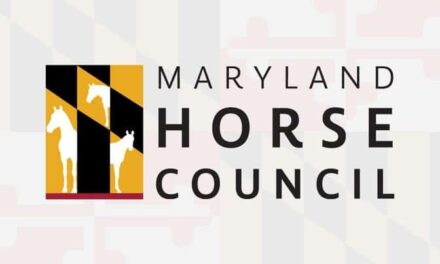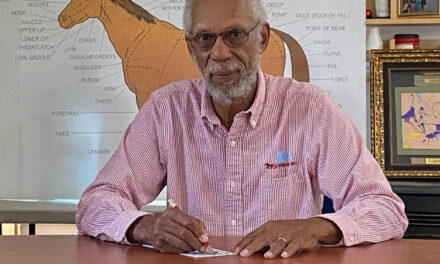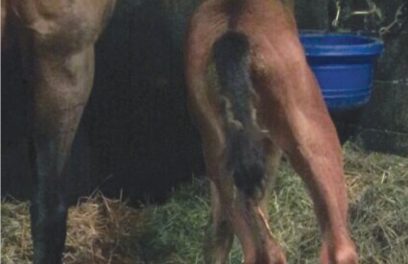first published in the July 2021 Equiery
by Kimberly K. Egan and Corinne M. Pouliquen
It’s the start of the Maryland Horse Council’s fiscal year, which means the new MHC board members and the new MHC officers officially begin their terms. We are excited to get to work as your Co-Presidents, and we want to use our first Presidents’ Letter to give you a sense of our plans for the next two years.
We cannot start, however, without recognizing the prodigious accomplishments of our predecessor, Neil Agate.
Neil shepherded the Maryland Horse Council through what was probably the most tumultuous period in its 35-year history. In his first six months in office, Neil successfully negotiated the purchase of The Equiery, which took MHC’s ability to communicate with its members and with the horse community at large to a new level. The Equiery expanded MHC’s on-line presence and its social media reach, transforming MHC from an organization with an annual budget in the range of $25,000, to an organization with an annual budget in the $350,000 range.
Neil also presided over the creation of the Maryland Equine Transition Service (METS), and shortly thereafter, The Maryland Horse Council Foundation. The METS program went from nothing at the beginning of 2018 to an important part of the equine safety-net by 2021. METS has re-homed over 100 horses in just three years. The Foundation has grown into a free-standing 501(c)(3), with its own Board and its own donor base. It is the official home of the METS program and is well on its way to developing new programming to benefit the Maryland horse industry.
Last but not least, Neil spent the last 15 months of his term guiding MHC through the COVID pandemic. The pandemic affected MHC operations just as it affected horse operations across the state. Neil worked tirelessly with the Maryland Horse Industry Board and the Maryland Department of Agriculture to open up horse businesses as soon as possible, and he was instrumental in convincing the Department of Natural Resources to allow trail riders back on public lands.
Any one of these events would be a challenge for any president – that Neil faced down all three during his tenure is a testament to his dedication to the Maryland Horse Council and his faith in its ability to do good and necessary work for all segments of our industry.
The two of us hope to build on MHC’s current momentum by focusing on three areas:
1. Our Membership. As a membership organization, there really is nothing more important than nurturing our current members and reaching out to new ones. Our new Membership Committee will focus on expanding member benefits, developing effective recruitment materials, developing internal membership communications materials, and planning members-only social events. We plan to increase the educational value we push out to members by offering webinars and town halls on the issues like non-chemical strategies for EHV-1 prevention and how to apply for state bond funds. We plan to re-double our recruiting efforts in Washington County, Allegany County, and Garrett County, as well as in Southern Maryland and on the Eastern Shore. We are planning new recruiting initiatives to increase membership participation from previously under-represented disciplines, including barrel racing, competitive trail riding, cutting, driving, endurance riding, harness racing, jousting, reining, rodeo riding, western dressage, and working equitation. And we plan to work harder to make sure the MHC membership is representative of all horse people in Maryland, regardless of race, sex, sexual orientation, gender identity, ethnicity, physical or other ability, or socio-economic status. Variety is the spice of life.
2. Our Reach. As a trade association, our very reason for being is to represent the horse industry to state and local government. Effective advocacy requires effective community organizing and effective legislative outreach. We hope to improve the breadth and depth of our substantive reach by upgrading our software tools, our digital re-marketing tools, and our on-line advocacy tools. We need to bring our contact management platforms up to the highest possible standard and streamline our processes for managing information about potential sponsors, likely legislative allies, and important and strategic industry contacts. As a state-wide organization, we also need to make sure that any member in any part of the state can easily access our robust educational resources, our written testimony in Annapolis, our member benefits information, and other MHC information on-line. Data management is not the sexiest topic, to be sure, but if we do it right, the results should blow your socks off.
3. Our Finances. We cannot accomplish either of the two goals above if we don’t also tend to our finances. All roads lead to the bank. We have already started a top-to-bottom review of our structure and our programs to weed out inefficiencies and free up volunteer and staff time for new initiatives. We are actively searching to fill out MHC’s political action committee board so that we can build a war chest to fund our legislative initiatives. And we are brainstorming innovative fundraising events that we hope will uncover previously un-tapped streams of cash and coin.
We expect these areas will keep us plenty busy for the next two years. But with a lot of hard work, a little luck, and plenty of help from our friends, we can take MHC to the next level, for the benefit of us all.
How the Maryland Horse Council Works
There are a lot of horse-related non-profits in our state, and most of them have the words “Horse” and “Maryland” somewhere in the title. It’s easy to get them confused. We thought it would be helpful to explain to our readers how our non-profit, its affiliated entities, and our associated acronyms, each fit into the bigger picture.
Our non-profit, the Maryland Horse Council (MHC), is a 501(c)(6) trade association that is run by an all-volunteer Board of Directors and an all-volunteer Executive Committee. A 501(c)(6) “trade association” is a private, non-governmental, membership organization that is in some ways similar to a chamber of commerce, except that unlike a chamber of commerce, we are open not only to those who are in the horse business, but also to all those who participate or are interested in the equestrian community. We are the umbrella organization for all of Maryland’s horse folks. Our members include everyone from the owners of huge barns, farms and even racetracks, to the owner of a single, beloved, backyard “lawn ornament,” and everyone in between. We welcome everyone, and work to serve all.
Our mission is to lobby state and local government for sensible and economically sound policies that affect the horse industry, and to provide educational and business networking resources for the Maryland horse community. We have been helping the Maryland horse industry for over 35 years.
MHC publishes a trade magazine–The Equiery–in which we disseminate horse industry news, educational articles, photos, and profiles on horse businesses and horse people. The Equiery also maintains a service directory for businesses that serve the Maryland horse industry, as well as a lesson and boarding barn directory.
MHC has eight standing committees:
1. the Executive Committee;
2. the Government Relations Committee;
3. the Membership Committee;
4. the Equine-Assisted Therapy Committee;
5. the Farm Stewardship Committee;
6. the Trails and Greenways Committee;
7. the Thoroughbreds and Standardbreds Committee; and
8. the Business Professionals Committee.
Executive Committee
This committee is elected by the Board of Directors and is comprised of the officers of MHC plus five additional MHC members. It executes the business of the MHC, subject to the policies and priorities established by the Board. The Executive Committee is chaired by the Co-Presidents, Kim Egan and Corinne Pouliquen.
Government Relations Committee
This committee represents the Maryland horse community before state, county, and local entities by presenting written and oral testimony at hearings, by generating member communications on legislative activities of interest, and by educating both legislators and members on matters of policy relevant to the horse industry. The current chair is Jane Seigler.
Membership Committee
This committee grows MHC’s membership base by developing concepts for member benefits, developing recruitment and membership material for all equine constituencies, developing internal membership communications material, and planning outreach events. The current chair is Ashley Adams Aycock.
Equine-Assisted Therapy Committee
This committee liaises with the therapeutic riding community, including therapeutic-riding centers, veteran assistance programs, and other organizations that connect horses and people as a catalyst for wellness. The current chair is Laura Lane-Unsworth.
Farm Stewardship Committee
This committee helps horse farm owners and managers reach their land stewardship goals by providing user-friendly information, community support, and access to information on financing and other incentives. The committee also brings the voice of the horse community into discussions of laws, regulations and incentive programs for sustainable agriculture and environmental protection. The current chair is Jane Thery.
Trails and Greenways Committee
This committee liaises with Maryland’s trail and greenways equestrian groups, supports recreational land uses including public trails and trail access, and provides educational opportunities for horsemen working on local land use issues. The current chair is Carolann Sharpe. Read more about this committee on page 15 of this issue!
Thoroughbreds and Standardbreds Committee
This committee liaises with the Maryland Thoroughbred and Standardbred industries, assists with horoughbred and Standardbred aftercare through METS, and raises awareness of track re-development, safe track research, and back stretch support at Maryland venues. The current chair is Kim Egan.
Business Professionals Committee
This committee hosts networking events for MHC’s Industry Professional members, such as educational seminars and social gatherings. The current chair is Crystal Brumme Pickett.
We are affiliated with a § 527 non-connected political action committee that raises private money to support horse-friendly candidates for State and local offices. The PAC is called, imaginatively, the Maryland Horse Council Political Action Committee.
Last but not least, we are affiliated with a public charity called, similarly imaginatively, the Maryland Horse Council Foundation, Inc. (“the Foundation”). The Foundation is a 501(c)(3) non-profit dedicated to the Maryland horse industry and to solidifying the strong ties between Maryland residents and the Maryland equine community. The Foundation runs the Maryland Equine Transition Service (METS), a conduit program that provides safe alternatives for horses needing homes by helping owners identify and select the best transition options for their horses.












